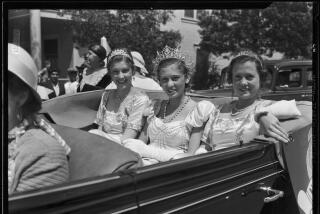Teaching That Black Is Beautiful : Females Suffer More in Mostly White Social Settings
- Share via
Lenora Terrance has spent considerable time worrying about her oldest daughter’s senior prom.
She thinks about what type of dress 16-year-old Misty will wear next year, questions just how it will fit and envisions the perfect hairstyle for that special night.
But most of all, she worries whether her daughter will even have a date.
Misty is one of only 20 black students who attend Brea-Olinda High School, and as one of 14 black girls in comparison to six black males, she faces the difficult situation of rarely getting asked out on dates.
“In a way I am grateful she’s not dating that much with so many things happening,” Terrance said. “But I worry she’s missing out on some of the wonderful things about growing up.”
Counselors and psychologists both agree that black females often suffer the most socially when they are in a predominantly white environment.
“Black women as a rule are not typically considered beautiful by the American public,” said Phyl Robinson, an Anaheim-based psychologist. “Long blond hair and blues eyes are posted everywhere in magazines and television as an example of what beautiful should look like. Black women don’t fit that image.”
Though the current Miss America and Miss USA are both black, Robinson said they are the exception rather than the rule. She added that ebony skin and medium to short hair for the most part isn’t attractive to men of other racial groups and many times not even to black men.
“Some black males tend to also buy into the blond-hair stereotype that is everywhere for all to see, despite the fact their mothers and sisters are black,” Robinson said. “And in addition to that it has always been more acceptable for a black man to date a white woman. For many black men, it gives them a feeling that they’ve accomplished something grand by going outside the race for a mate.”
Misty, who is in her junior year at Brea, says she is frustrated because the few black boys at her school mostly date white girls, leaving her at home most Saturday nights.
“I am bothered by it a lot,” she said. “Black guys seem to think white girls have more going for them or something and white guys hardly notice me.”
From time to time, the family has considered moving from their comfortable Brea home to a more ethnically mixed neighborhood. “It’s something we considered because we want our kids to get the best experience possible in everything,” said Chris Terrance Jr., an insurance claims adjuster who was transferred here from Washington state. “They are getting a good education here but there is more to high school than that. I’d like for Misty and our younger daughter to have an opportunity to meet and see a variety of people.”
In an effort to rectify the problem, the family recently became involved with a variety of Orange County black organizations, including the Orange County Black Actors Theater and a black church in Santa Ana where they hope Misty will meet a young man her age.
“Prom is a very important occasion in a young lady’s life,” said Lenora Terrance. “Our daughters shouldn’t have to miss out on that just because some people don’t realize how beautiful black is.”
More to Read
Sign up for Essential California
The most important California stories and recommendations in your inbox every morning.
You may occasionally receive promotional content from the Los Angeles Times.













